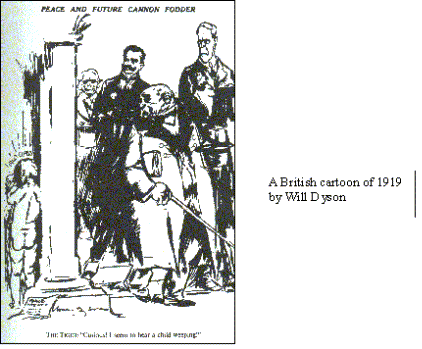|
The Paris Peace Treaties
Look at the cartoon and then answer the questions
which follow.

(a) Describe what Georges Clemenceau
wished to achieve at the Paris peace conference. [5] answer
(b) Why did Wilson fail to persuade the
other victorious powers that his Fourteen Points should form the basis
of the peace settlement? [7] answer
(c) Was the Treaty of Versailles fair? Explain
your answer. [8] answer Suggested
Answers (a) Using the
stimulus material you will have noticed that Clemenceau was nicknamed
the ‘tiger’. Concentrate on his desire for revenge and compensation
and explain this motivation in terms of the enormous French suffering in
a war that was largely fought in France. Clemenceau wished to weaken
Germany (divide her, make her pay reparations etc.) so as to prevent a
future invasion of France. [back to questions] (b)
You need to begin by outlining the
essence of Wilson’s Fourteen Points. They were an idealistic set of
principles designed to prevent future wars. You should notice that the
Fourteen Points were not ignored. The LoN was set up,
Alsace and Lorraine were returned to France, an independent Poland was
set up with access to the sea etc. (see McAleavy p.21) However, not all
the points were acted upon because (and bear in mind that this also
explains why the settlement was a general compromise):
(i)
The pressure of time. Fear of communism in particular meant that had to
act quickly and power vacuum in central-southern Europe (further
help) (ii) Conflict of Interest.
(further help) National
interests were more important than international ideals e.g. the
protection of the British Empire was more important than
self-determination. [back to
questions] (c)
Remember this is an evaluative essay and you must
consider both sides of the argument (p.28 of McAleavy gives you basic
points and you can get further
help on this site). You could answer this by reference to the
opposing views of JM Keynes who thought it unfair (undeserved war guilt
clause, inconsistent application of self-determination etc.) and Sally
Marks who thought it was fair (could have been a lot worse, Versailles
was relatively restrained, basis of German future economic and military
strength untouched etc.). Remember to produce supporting evidence for
each of the views expressed. The very best responses have a clear
conclusion that explains why one set of arguments is more persuasive
than another. [back to questions]
|